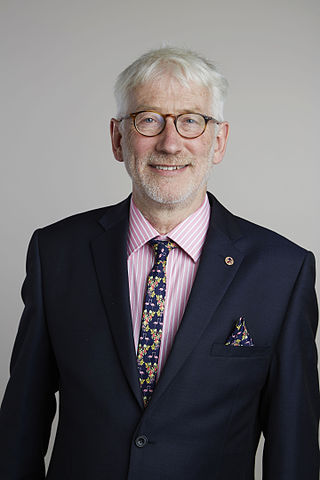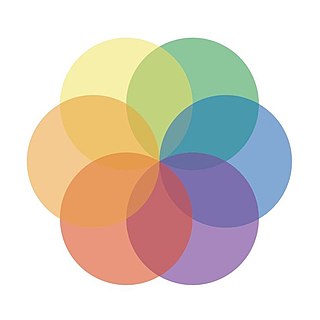
Quantum information is the information of the state of a quantum system. It is the basic entity of study in quantum information theory, and can be manipulated using quantum information processing techniques. Quantum information refers to both the technical definition in terms of Von Neumann entropy and the general computational term.
Atomic, molecular, and optical physics (AMO) is the study of matter–matter and light–matter interactions, at the scale of one or a few atoms and energy scales around several electron volts. The three areas are closely interrelated. AMO theory includes classical, semi-classical and quantum treatments. Typically, the theory and applications of emission, absorption, scattering of electromagnetic radiation (light) from excited atoms and molecules, analysis of spectroscopy, generation of lasers and masers, and the optical properties of matter in general, fall into these categories.
Quantum key distribution (QKD) is a secure communication method that implements a cryptographic protocol involving components of quantum mechanics. It enables two parties to produce a shared random secret key known only to them, which then can be used to encrypt and decrypt messages. The process of quantum key distribution is not to be confused with quantum cryptography, as it is the best-known example of a quantum-cryptographic task.
This is a timeline of quantum computing.
Quantum optics is a branch of atomic, molecular, and optical physics dealing with how individual quanta of light, known as photons, interact with atoms and molecules. It includes the study of the particle-like properties of photons. Photons have been used to test many of the counter-intuitive predictions of quantum mechanics, such as entanglement and teleportation, and are a useful resource for quantum information processing.
Quantum information science is a field that combines the principles of quantum mechanics with information theory to study the processing, analysis, and transmission of information. It covers both theoretical and experimental aspects of quantum physics, including the limits of what can be achieved with quantum information. The term quantum information theory is sometimes used, but it does not include experimental research and can be confused with a subfield of quantum information science that deals with the processing of quantum information.

Anton Zeilinger is an Austrian quantum physicist and Nobel laureate in physics of 2022. Zeilinger is professor of physics emeritus at the University of Vienna and senior scientist at the Institute for Quantum Optics and Quantum Information of the Austrian Academy of Sciences. Most of his research concerns the fundamental aspects and applications of quantum entanglement.

Artur Konrad Ekert is a British-Polish professor of quantum physics at the Mathematical Institute, University of Oxford, professorial fellow in quantum physics and cryptography at Merton College, Oxford, Lee Kong Chian Centennial Professor at the National University of Singapore and the founding director of the Centre for Quantum Technologies (CQT). His research interests extend over most aspects of information processing in quantum-mechanical systems, with a focus on quantum communication and quantum computation. He is best known as one of the pioneers of quantum cryptography.

John G. Rarity is professor of optical communication systems in the department of electrical and electronic engineering at the University of Bristol, a post he has held since 1 January 2003. He is an international expert on quantum optics, quantum cryptography and quantum communication using single photons and entanglement. Rarity is a member of the Quantum Computation and Information group and quantum photonics at the University of Bristol.
Quantum cloning is a process that takes an arbitrary, unknown quantum state and makes an exact copy without altering the original state in any way. Quantum cloning is forbidden by the laws of quantum mechanics as shown by the no cloning theorem, which states that there is no operation for cloning any arbitrary state perfectly. In Dirac notation, the process of quantum cloning is described by:
Lai Choy Heng is Professor of Physics and the former Executive Vice-president, Yale-NUS College (2012–2013) and Vice Provost at the National University of Singapore (2003–2012). He received his undergraduate as well as graduate degrees from the University of Chicago. He took up a position as post-doctoral Research Fellow at the Niels Bohr Institute, University of Copenhagen from 1978 to 1980 after which he joined National University of Singapore’s (NUS) Department of Mathematics as a Lecturer. He then moved to the Department of Physics in 1981 which saw him rise through the ranks from senior lecturer to associate professor to professor.
Vlatko Vedral is a Serbian-born physicist and Professor in the Department of Physics at the University of Oxford and a Fellow of Wolfson College, Oxford. Until the summer of 2022 he also held a joint appointment at the Centre for Quantum Technologies (CQT) at the National University of Singapore. He is known for his research on the theory of quantum entanglement and quantum information theory. He has published numerous research papers, which are regularly cited, in quantum mechanics and quantum information, and was awarded the Royal Society Wolfson Research Merit Award in 2007. He has held a lectureship and readership at Imperial College, a professorship at Leeds and visiting professorships in Vienna, Singapore (NUS) and at the Perimeter Institute for Theoretical Physics in Canada. He is the author of several books, including Decoding Reality.
Quantum cryptography is the science of exploiting quantum mechanical properties to perform cryptographic tasks. The best known example of quantum cryptography is quantum key distribution, which offers an information-theoretically secure solution to the key exchange problem. The advantage of quantum cryptography lies in the fact that it allows the completion of various cryptographic tasks that are proven or conjectured to be impossible using only classical communication. For example, it is impossible to copy data encoded in a quantum state. If one attempts to read the encoded data, the quantum state will be changed due to wave function collapse. This could be used to detect eavesdropping in quantum key distribution (QKD).

The Centre for Quantum Computation (CQC) is an alliance of quantum information research groups at the University of Oxford. It was founded by Artur Ekert in 1998.
Berthold-Georg Englert is Provost's Chair Professor at the National University of Singapore, and Principal Investigator at the Centre for Quantum Technologies. In 2006, he was recognized for outstanding contributions to theoretical research on quantum coherence. B.-G. Englert's principal research interests concern applications in quantum information science, but he is also known for his early work on quantum optics together with Marlan Scully at Texas A&M University.
Zachary John Dutton is an American physicist who has worked on research centred mainly around cold atomic gases, EIT, low light level nonlinear optics, quantum memories, and coherent optical. Dutton graduated from Lindsay High School in Lindsay CA, and was awarded a BSc in physics from UC Berkeley in 1996. He was awarded his PhD in theoretical physics at Harvard University in 2000. His doctoral advisor was Prof.Lene Hau for his thesis entitled "Ultra-slow, stopped, and compressed light in Bose–Einstein condensates" He worked on a number of papers with Hau and Cyrus Behroozi, being amongst the first group to stop light completely. He undertook postdoctoral work at NIST–Gaithersburg with Dr. Charles Clark, prior to becoming a staff physicist at the Naval Research Lab in Washington. He conducted research centred mainly around cold atomic gases, EIT, low light level nonlinear optics, quantum memories, and coherent optical storage.
The Centre for Advanced 2D Materials (CA2DM), at the National University of Singapore (NUS), is the first centre in Asia dedicated to graphene research. The centre was established under the scientific advice of two Nobel Laureates in physics – Prof Andre Geim and Prof Konstantin Novoselov - who won the 2010 Nobel Prize in Physics for their discovery of graphene. It was created for the conception, characterization, theoretical modeling, and development of transformative technologies based on two-dimensional crystals, such as graphene. In 2019, Prof Konstantin Novoselov moved to Singapore and joined NUS as Distinguished Professor of Materials Science and Engineering.
Professor Margaret Daphne Reid from Swinburne University of Technology is a Fellow of the Australian Academy of Science. She is known for her pioneering work in new fundamental tests of quantum theory, including teleportation and cryptography.
In quantum computing, quantum memory is the quantum-mechanical version of ordinary computer memory. Whereas ordinary memory stores information as binary states, quantum memory stores a quantum state for later retrieval. These states hold useful computational information known as qubits. Unlike the classical memory of everyday computers, the states stored in quantum memory can be in a quantum superposition, giving much more practical flexibility in quantum algorithms than classical information storage.

The Dodd-Walls Centre for Photonic and Quantum Technologies is a New Zealand Centre of Research Excellence, established in 2015, hosted by the University of Otago, and composed of researchers in six New Zealand universities as well as partner institutions in the US, United Kingdom, and Singapore. It does fundamental research on the quantum nature of matter, the physics and optics of light, and the manipulation of individual photons. New knowledge and applications are commercialised for industries including agritech, medicine, and civil engineering.






